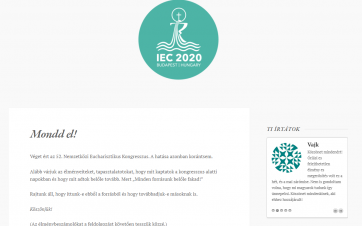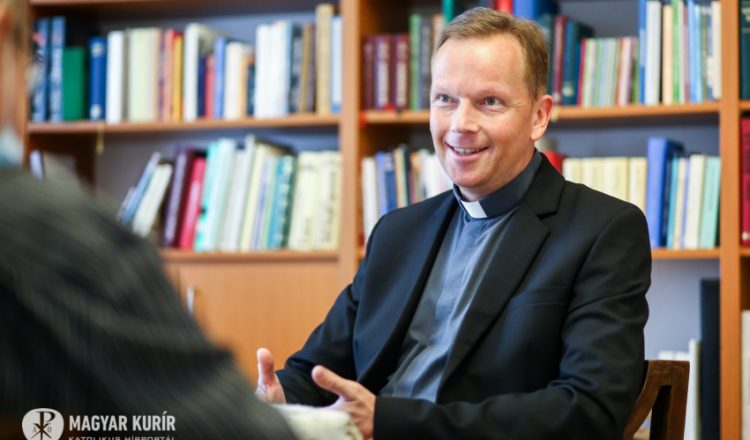
Tens of thousands are praying together

Cardinal Péter Erdő and the preparatory Secretariat of the 52 nd International Eucharistic Congress (IEC) have invited again for global common prayer on the Saturday of the Feast of Corpus Christi, 13 th June. Talk with Father Kornél Fábry, Secretary General of the Congress.
- It’s already the sixth times that a Worldwide Adoration and a common prayer have been called for the Feast of Corpus Christi, and for the Feast of Christ the King respectively. What are the main experiences?
- We are preparing ourselves for the International Eucharistic Congress, and this means one of the pillars to the preparation. When we speak about Corpus Christi day, we always connect it to the feast of the Eucharistic miracle. In the anthem of the 1938 Eucharistic Congress so we sing about Christ, as the King of the World: “Lord and King over the world under the appearance of bread and wine”. Since we have two holy festivals that specifically put the Eucharistic into the spotlight, the idea of holding a Worldwide Adoration simultaneously has just popped up naturally. Last year, on the vigil of the Feast of Christ the King there have been 1118 locations of 54 countries from all the continents around the globe that joined the common prayer. This year we have already surpassed these figures.
- You are using digital maps as well. What is the point of that?
- Parishes can log in themselves on the website corpusdomini.iec2020.hu, indicating when and where they are holding prayers for 24 hours, since the prayer chain is alive 24hour around the clock. Given the current pandemic situation, we have extended the possibilities: anyone can join even from their home. Registration is easy, just a simple “click” onto the website “join from home”, then fill in the form with the relevant location and postal code, and so the registration has been done. Thus we know whom we can count on. Goes without saying that Adoration cannot be held at home, but anyone can join the common prayer.
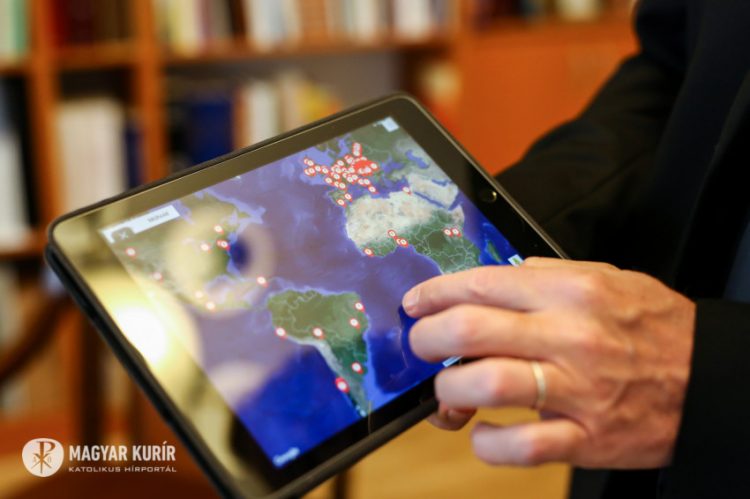
- How many join the Adoration?
- For this we do not have a measured figure, but what is for sure that generally tens of thousands are praying together at such an occasion.
- What spiritual power or effect this can have?
Let me tell you a few examples: we have got a feedback from America as well. A Father wrote that they had been just the two of them in the church, but knowing about the many besides them had given an enormous strength. We have received a letter from sisters in Japan: they were so much touched
by the experience during the common adoration that they have been doing so from that onwards on a weekly basis. Jesus said if two-three people gathered in his name, He would be there amongst them. Now, that’s not all, but many many more are praying together. As to a picture living within me the world is likely to be connected to God through the prayer, and the more way we bind to him, the more closer relationship we are going to have with Him, and the more His Kingdom on earth is going to be built.
- In the light of the current coronavirus world pandemic in what sense this present Worldwide Adoration will be different?
- Currently it will be more widespread, since joining is extended, and participants can also join from their homes with their personal prayers, as mentioned above.
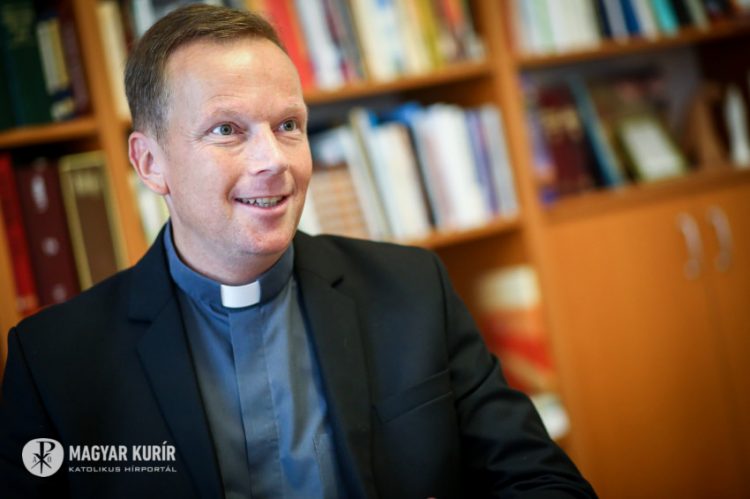
- “All my sources are in you” – as sounds the IEC motto. How does it reflect in our life? Recently I have read a book, the “Beautiful Eucharist”, in which Church Fathers confess on the Eucharist. Origen of Alexandria says: sincerity is the base of seeking for the Sacrament. Those receiving the
Eucharist, should take it with pure spirit and with a sincere desire for Christ body and for building the Church. “Participating in the communion supposes a real desire to live in a community with brothers in God. Those who do not want to live in peace with the faithful’s community, must not approach God’s altar.”
- I can only share my personal experience. “All springs are in you”: The Eucharist is the spring of goodness, love and endurance. In the Holy Communion we accept Christ into our heart, and He brings us peace and joy. Should I happen to be in an emotional stress, I sit down for an hour silent adoration. Thus my soul reconciles, since it was Jesus himself telling us: come to me all who are tired and I’m going to enliven you. Jesus is the source of all life, of the joy, love and the source of our community. Without him we just cannot do anything. Therefore, from now on He should be the source of our acts and thoughts. Whatever we do without Him, is not necessarily good, in fact…When He is leading us, for sure we won’t go on the wrong track. Thus the Congress has a daily theme. Joy, peace, love, fidelity, all deriving from the Eucharist. Should we remain faithful to the Eucharist, this would bring fruits within ourselves.
- How does the will and the divine grace relate to each other? Do we need both in order to follow the sound of Spirit in our daily lives or the Christ being present in the Sacrament?
- We should be in cooperation with the grace. An old example:
Should the Eucharist be chewed by the mouse of the church, it would not become a saint. Should one take only one single sacred host that would not trigger too much grace impact. But, if I prepare myself ahead for a personal meeting with Jesus, then I experience it far better.
Let’s see a profane analogy: A surfer, lying on his surfboard but without being on the move. When lifted up by the wave he is left where he is. But should he be prepared well ahead, and the wave hits him on the move, then he can glide far away on it. Meeting God also needs preparation, so that it would be a real meeting, not just a shallow get-together. God’s mercy has not limits, He affects everyone the way He wants, but our cooperation makes it a fruitful one. This is the key point: there is the sacrament, what we deliver on to many, but the bloom off greatly depends on the preparation and on the receiving person.
- When attending an adoration should I nicely dress up my heart, and take the event as a feast?
There is an interesting duality, on one hand I’m preparing, while on the other hand I can just show up myself the way I am. In the adoration, apart from showing my respect and adoration, I can ask Him to give me all I’m in need of. To fill me up with His love, when I have already run out of mine. This is very true both for the Holy Communion and for the Adoration. I have the habit of asking: Dear Jesus please transform my heart, make it alike to that of Yours, and fill it up with all your love.
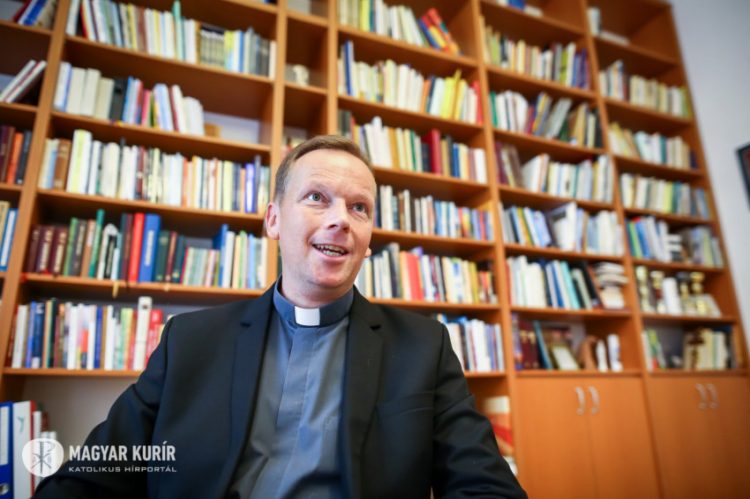
- Pope Frances many times called our attention that besides letting Christ into ourselves, our duty, as Christians is to take His boundless love out to the world.
- Pope Frances tells us almost daily that we should open up towards the peripheries, we should step out of the Church walls. This current pandemic situation might have been of help in this field as well. Though churches were closed, the online space has opened up. Many fathers noted that the online broadcasted Holy Masses were followed by far more, comparing to the usually physically present attendees in the Church. Goes without saying the two cannot be mentioned on the same page. In turn, due to the current situation we had the chance to step outside the walls on a new way, even if it does not substitute the alive atmosphere of the church itself.
- It was mentioned at the beginning of our talk that declaring Corpus Christi day as a feast is linked to an Eucharistic miracle. Though we are talking about one of the most significant Catholic feasts, yet it does not raise much public awareness.
- The origin of the Corpus Christi can be traced back to two lines. One is linked to Belgium, while the other one to Italy. St. Juliana of Liege had a vision in 1209: she saw the full Moon with a dark spot in. She was then
asked by Jesus to be the promoter of a separate feast within the Church’s liturgical year, for a universal celebration honouring the Holy Eucharist as of Christ’s body and blood. First it had spread around Belgium, later on due to the Eucharistic miracle in Bolsena, Pope Urban IV decided to have it as a feast of the whole Church. The story of the Eucharistic miracle in Bolsena can be found on the website:miracolieucaristici.org, while further 170 Eucharistic miracles are also described. (out of them sixty in Hungarian as well) The Pope commissioned the era’s prominent theologian, St. Thomas Aquinas, to write the texts for the Mass and the Feast. Our holy song, the Tantum Ergo Sacramentum dates back to this time. The Feast of Corpus Christi has beautiful, spectacular elements, like the procession. Many settlements prepare flower carpet for Lord Jesus Christ. Other places favour of scattering flower petals in front of the Sacrament. All these are nice and touching expressions of love, honour and that we give up everything for Jesus. We are going out to the street making testimony that “Lord and King over the world under the appearance of bread and wine”. This gives the importance to understand, what a great treasure and source of life the Eucharist is.
Photo: Attila Lambert
Text: Dániel Bodnár/Magyar Kurír




